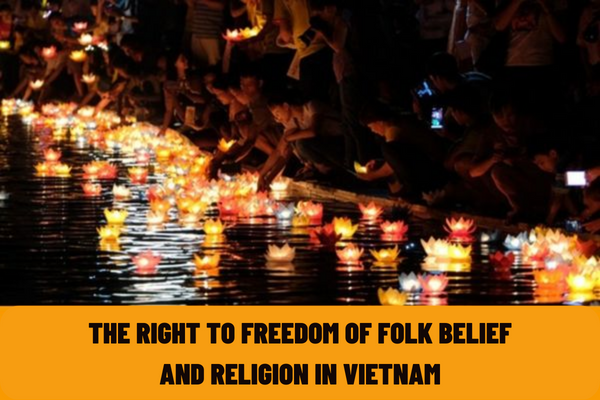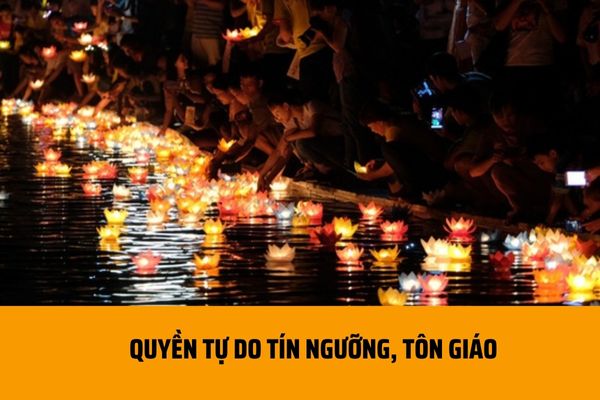Vietnam: What is folk belief and religion? How is the right to freedom of folk belief and religion regulated nowadays?
How is the definition of folk belief and religion defined?
Pursuant to the provisions of Clause 1, Article 2 of the 2016 Law on Religion and Folk Belief in Vietnam, Clause 5, Article 2 of the 2016 Law on Religion and Folk Belief in Vietnam, the definition of folk belief and religion is as follows:
- Folk belief represents the human’s faith manifested through rituals in connection with traditional custom to bring about individual and communal spiritual peace.
- Religion represents the human's faith whose existence is accompanied by a system of notions and activities encompassing the objects of worship, tenets, religious law, rites and organization.

Vietnam: What is folk belief and religion? How is the right to freedom of folk belief and religion regulated nowadays? (Image from the Internet)
How is the right to freedom of folk belief and religion regulated nowadays?
The right to freedom of folk belief and religion is stipulated in Chapter II of the 2016 Law on Religion and Folk Belief in Vietnam. To be specific:
(1) For every person
- Every person has the right to freedom of religion and folk belief and the right to follow or not to follow a religion.
- Every person has the right to manifest the faith of religion or folk belief and to perform religious and folk religious rites; participate in festivals; learn and exercise religious law and tenets.
- Every person has the right to pursue a monastic life in religious establishments and pursue education in religious educational institutions and religious organizations’ supplementary courses. Adolescents require the permission of their parents or guardians for pursuing a monastic life in a religious establishment or pursuing education in a religious educational institution.
- Dignitaries, sub-dignitaries and monastics have the right to perform religious rites, to preach and to do missionary work in religious establishments or at legitimate locations.
- People held in detention pursuant to the legislation on temporary detention, people serving time in prison, people sent to a reformatory, compulsory education institution or compulsory rehabilitation center have the right to read scriptures and manifest their faith of religion or folk belief.
(2) For religious organizations and religious affiliates
- Carry out religious activities pursuant to the religious organization’s charter, regulations and similar literature (hereinafter referred to as the charter).
- Organize the practice of religion.
- Publish religious scriptures and publications.
- Produce, import and export religious cultural products and articles.
- Overhaul, upgrade and construct religious establishments.
- Receive legitimate assets that domestic and foreign organizations and individuals donate voluntarily.
- Have other rights defined in this Law and in relevant legislative documents.
(3) For foreigners residing lawfully in Vietnam
- The government of Vietnam respects and protects the right to freedom of religion and folk belief of the foreigners who reside lawfully in Vietnam.
- Foreigners residing lawfully in Vietnam have the right to:
+ Practice religion, practice folk beliefs and participate in religious activities;
+ Practice religion en masse at legitimate locations;
+ Invite Vietnamese dignitaries, sub-dignitaries and monastics to perform religious rites and preach; invite foreign dignitaries and monastics to deliver sermon;
+ Pursue a monastic life in religious establishments, pursue education in religious educational institutions and attend supplementary courses in religious establishments in Vietnam;
+ Carry religious publications and articles to practice religion pursuant to the laws of Vietnam.
- Foreign dignitaries and monastics who reside lawfully in Vietnam are permitted to give sermons in religious establishments or at legitimate locations in Vietnam.
Thus, the obligations of organizations and individuals when exercising the right to freedom of religion and folk belief include:
- Organizations and individuals practicing folk beliefs and participating in religious activities shall adhere to the Constitution, this Law and other relevant legal regulations.
- Dignitaries, sub-dignitaries, monastics, representatives and the management of folk religious establishments shall be responsible for guiding followers and participants in the practice of folk beliefs and religious activities to abide by the law when practicing folk beliefs and conducting religious activities.
What are the responsibilities of the Government of Vietnam for maintaining the right to freedom of religion and belief?
Pursuant to Article 3 of the 2016 Law on Religion and Folk Belief in Vietnam as follows:
Responsibilities of the Government of Vietnam for maintaining the right to freedom of religion and belief
1. The government respects and protects the right to freedom of religion and belief of every person and maintains the equality of religions before the law.
2. The government upholds and defends the virtuous and cultural values of folk beliefs, religions, worshiping of ancestors and honoring of individuals with meritorious contributions to the country or the public to gratify the people’s spiritual pursuits.
3. The government protects folk religious and religious establishments and their legitimate assets.
Thus, the responsibilities of the Government of Vietnam for maintaining the right to freedom of religion and belief include:
- The government respects and protects the right to freedom of religion and belief of every person and maintains the equality of religions before the law.
- The government upholds and defends the virtuous and cultural values of folk beliefs, religions, worshiping of ancestors and honoring of individuals with meritorious contributions to the country or the public to gratify the people’s spiritual pursuits.
- The government protects folk religious and religious establishments and their legitimate assets.
LawNet
